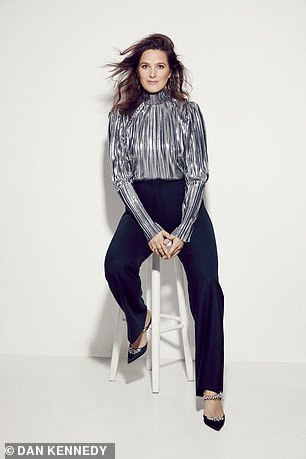Elizabeth Day: Has Covid killed my dream of motherhood?
Styling: Holly Elgeti. Make-up: Nicky Weir using Hourglass Beauty. Hair: Alex Szabo at Carol Hayes using T3 Haircare. Shirt, Lisou. Earrings, Missoma. Trousers, Marella. Rings, Daisy Jewellery, Pilgrim.
I recently discovered the existence of a mechanical clock designed to tick once every year. It is currently under construction, funded by the Amazon billionaire Jeff Bezos, and is being built to last ten millennia.
I’m not sure what purpose it serves, but there’s no accounting for the whims of the super-rich. What stayed with me when I read about it was the name: The Clock of the Long Now.
It so evocatively encapsulates what it is to live through lockdown in a global pandemic. Every minute of the ‘now’ feels long in our current state as we wait uncertainly to see whether we’ll be allowed out for school and holidays and restaurant meals in the next few months or not.
But the reason it struck a particular chord is because I am a woman who, at 42, still yearns to be a mother. My chances are governed by another clock – the biological one – which operates at a far speedier rate than the Bezos version. As someone who has experienced three miscarriages – the last one during the first national lockdown – the medical advice for me is to be closely monitored during the perilous first trimester. Currently, this is impossible.
Covid has had many awful consequences. One of them is that fertility treatment for women has been delayed. Those one-on-one appointments and regular internal scans that I would require as a high-risk mother-to-be have been suspended in all but the most essential cases in order to avoid spreading the virus. This is absolutely right and proper. But it is a difficult thing to process. At the same time as I desperately want to try to conceive, I also need to heed the medical advice and be sensible, which means a delay of, as yet, unknown time. Every week that passes means the further ticking of my biological clock. It’s a decision I’ve taken, but I wish I hadn’t had to. I wish, as we all do, that we weren’t having to make these kinds of choices.
It has been even worse for those women struggling with fertility who, during the first national lockdown, had their rounds of IVF or egg donation cancelled. As someone who has been through IVF herself, I can attest to the emotional, physical and mental burden it exacts. To have geared yourself up and to have put all your hopes for future parenthood on that cycle only to have it ripped away must be excruciating. That is bad enough, but women also have to contend with the uncomfortable reality that any postponement can result in a decline of fertility. The longer you wait, we are told, the less likely it is to happen.
During the lockdowns, when there has been much talk of home-schooling and the stresses involved in parenting, it has been increasingly difficult for women who desperately want to be mothers to avoid the jarring disconnect between us and them. In normal life, I can take my mind off things by meeting friends or booking a last-minute mini-break or going to the cinema, and remind myself how lucky I am that I don’t need to arrange childcare in order to do so. That escape is no longer available.
I feel, too, for the single women who want a relationship, whose dating life is now reduced to unsatisfying Zoom calls and the odd socially distanced walk in the park. Modern dating is hard enough without having to forge meaningful connections through a computer screen. I know that if Covid had hit when I was single at the age of 39, I would have felt panicked that my chances of a family life were dwindling with every passing day.
Of course, there are bigger problems. And of course not everyone wants children. But for those who do, lockdown has posed a difficult challenge. These women are often invisible, and in writing this, I hope they know that they are seen and that my heart is with them.
This week I’m…
